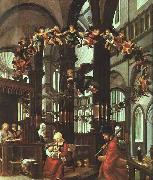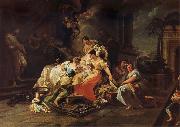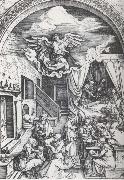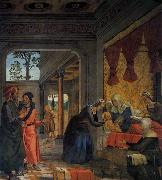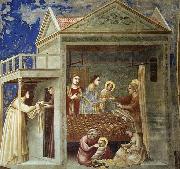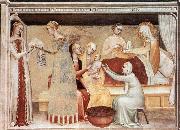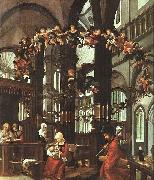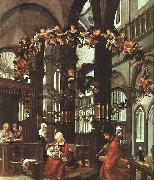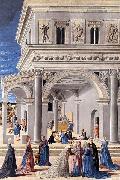Wholesale Oil Painting No Minimum |
|||||||||||
|
|
|||||||||||

|
|||||||||||
|
|
|
||||||||
Albrecht AltdorferGerman 1480-1538 Albrecht Altdorfer Galleries He most often painted religious scenes, but is mainly famous as the first frequent painter of pure landscape, and also compositions dominated by their landscape. Taking and developing the landscape style of Lucas Cranach the Elder, he shows the hilly landscape of the Danube valley with thick forests of drooping and crumbling firs and larches hung with moss, and often dramatic colouring from a rising or setting sun. His Landscape with footbridge (National Gallery, London) of 1518-20 is claimed to be the first pure landscape in oil. He also made many fine finished drawings, mostly landscapes, in pen and watercolour. His best religious scenes are intense, sometimes verging on the expressionistic, and often depict moments of intimacy between Christ and his mother, or others. His most famous religious artwork is the The Legend of St. Sebastian and the Passion of Christ that decorated the altar in the St. Florian monastery in Linz, Austria. He often distorts perspective to subtle effect. His donor figures are often painted completely out of scale with the main scene, as in paintings of the previous centuries. He also painted some portraits; overall his painted oeuvre was not large. |
||||||||
|
|
||||||||
The Birth of the Virgin
The Birth of the Virgin Painting ID:: 2294 |
1525
Pinakothek, Munich 1525 Pinakothek, Munich |
|||||||
|
|
||||||||
Corrado Giaquinto1703-1766 Italian Corrado Giaquinto Galleries He was born in Molfetta. As a boy he apprenticed with a modest local painter Saverio Porta, (c1667-1725), escaping the religious career his parents had intended for him. By October 1724, he left Molfetta, and along with his contemporaries Francesco de Mura (1696-1784) and Giuseppe Bonito (1707-1789), he trained from 1719-23 in the prolific Neapolitan studio of Francesco Solimena, either with Solimena or his pupil, Nicola Maria Rossi. Throughout his life, Giaquinto was a peripatetic painter, with long sojourns in Naples, Rome (between 1723-53), Turin (1733 and 1735-9), and Madrid (1753-1761). In 1723, he moved to Rome to work in the studio of Sebastiano Conca. He painted in San Lorenzo in Damaso, San Giovanni Calibita, and the ceiling at Santa Croce in Gerusalemme. In March 1727, with Giuseppe Rossi as an assistant, Giaquinto opened an independent studio near the Ponte Sisto, in the parish of Saint Giovanni of the Malva in Rome. In 1734, he married Caterina Silvestri Agate. The first documented work by his hand is Christ crucified with the Madonna, Saint John Evangelist, and Magdalene commissioned in 1730 by king John V of Portugal for the cathedral of the Mafra. In 1731, he received a prestigious commission, to execute frescoes in the church of San Nicola dei Lorenesi: Saint Nicholas water gush from cliff, three theologic and cardinal Virtues, and in the cupola Paradise. The latest restoration confirms Giaquinto stylistic independence from Solimena, and reveals his stylistic dependence on Luca Giordano. |
||||||||
|
|
||||||||
|
|
The birth of the Virgin
The birth of the Virgin Painting ID:: 42055 |
mk166
1753
I Wave sbre cloth
72x103cm
Uffizi, Florence mk166 1753 I Wave sbre cloth 72x103cm Uffizi, Florence |
||||||
|
|
||||||||
Albrecht Durerb.May 21, 1471, Imperial Free City of Nernberg [Germany] d.April 6, 1528, Nernberg Albrecht Durer (May 21, 1471 ?C April 6, 1528) was a German painter, printmaker and theorist from Nuremberg. His still-famous works include the Apocalypse woodcuts, Knight, Death, and the Devil (1513), Saint Jerome in his Study (1514) and Melencolia I (1514), which has been the subject of extensive analysis and interpretation. His watercolours mark him as one of the first European landscape artists, while his ambitious woodcuts revolutionized the potential of that medium. D??rer introduction of classical motifs into Northern art, through his knowledge of Italian artists and German humanists, have secured his reputation as one of the most important figures of the Northern Renaissance. This is reinforced by his theoretical treatise which involve principles of mathematics, perspective and ideal proportions. His prints established his reputation across Europe when he was still in his twenties, and he has been conventionally regarded as the greatest artist of the Renaissance in Northern Europe ever since. |
||||||||
|
|
||||||||
|
|
The Birth of the virgin
The Birth of the virgin Painting ID:: 42436 |
mk168
297x210mm
mk168 297x210mm |
||||||
|
|
||||||||
Juan de BorgonaSpanish Painter, ca.1470-1534 was a High Renaissance painter who was born in the Duchy of Burgundy, probably just before it ceased to exist as an independent state, and was active in Spain from about 1495 to 1534. His earliest documented work was painted in 1495 for the cloister of the Cathedral of Toledo. Borgoña??s compositions are well balanced with finely drawn figures in elegant, tranquil poses. They are set either against open spaces leading on to craggy landscapes or against gold embroidered drapery. There were a number of foreign painters active in Spain in this period, including Juan de Flandes. Borgona??s students include Pedro de Cisneros the Elder (died 1546), Antonio de Comontes (ca. 1500-1519), |
||||||||
|
|
||||||||
|
|
The Birth of the Virgin
The Birth of the Virgin Painting ID:: 52604 |
Virgin 1509-11 Fresco Chapter room Virgin 1509-11 Fresco Chapter room |
||||||
|
|
||||||||
GIOTTO di BondoneItalian Early Renaissance Painter, 1267-1337 Italian painter and designer. In his own time and place he had an unrivalled reputation as the best painter and as an innovator, superior to all his predecessors, and he became the first post-Classical artist whose fame extended beyond his lifetime and native city. This was partly the consequence of the rich literary culture of two of the cities where he worked, Padua and Florence. Writing on art in Florence was pioneered by gifted authors and, although not quite art criticism, it involved the comparison of local artists in terms of quality. The most famous single appreciation is found in Dante's verses (Purgatory x) of 1315 or earlier. Exemplifying the transience of fame, first with poets and manuscript illuminators, Dante then remarked that the fame of Cimabue, who had supposed himself to be the leader in painting, had now been displaced by Giotto. Ironically, this text was one factor that forestalled the similar eclipse of Giotto's fame, which was clearly implied by the poet. |
||||||||
|
|
||||||||
|
|
The Birth of the Virgin
The Birth of the Virgin Painting ID:: 62993 |
1304-06 Fresco, 200 x 185 cm Cappella Scrovegni (Arena Chapel), Padua The six scenes on the wall opposite to the scenes from the life of Joachim show the Birth of the Virgin, the Presentation of the Virgin in the Temple, and the four episodes pertaining to her marriage: the Rods brought to the Temple, the Prayer of the Suitors, the Marriage of the Virgin and the Wedding Procession. The birth of the Virgin takes place in the same house as the annunciation to Anne. In the small room, somewhat too narrow for the figures, Anne sits up in bed and is handed the baby in its swaddling clothes by a nursemaid. The child appears for a second time in the idyllic scene in front of the mothers bed. As in the Annunciation scene, Giotto also shows the view of the building from outside. He does not divide interior and exterior, but connects them using the two women. Artist: GIOTTO di Bondone Painting Title: No. 7 Scenes from the Life of the Virgin: 1. The Birth of the Virgin , 1301-1350 Painting Style: Italian , , religious 1304-06 Fresco, 200 x 185 cm Cappella Scrovegni (Arena Chapel), Padua The six scenes on the wall opposite to the scenes from the life of Joachim show the Birth of the Virgin, the Presentation of the Virgin in the Temple, and the four episodes pertaining to her marriage: the Rods brought to the Temple, the Prayer of the Suitors, the Marriage of the Virgin and the Wedding Procession. The birth of the Virgin takes place in the same house as the annunciation to Anne. In the small room, somewhat too narrow for the figures, Anne sits up in bed and is handed the baby in its swaddling clothes by a nursemaid. The child appears for a second time in the idyllic scene in front of the mothers bed. As in the Annunciation scene, Giotto also shows the view of the building from outside. He does not divide interior and exterior, but connects them using the two women. Artist: GIOTTO di Bondone Painting Title: No. 7 Scenes from the Life of the Virgin: 1. The Birth of the Virgin , 1301-1350 Painting Style: Italian , , religious |
||||||
|
|
||||||||
GIOVANNI DA MILANOItalian Gothic Era Painter, active 1350-1369 |
||||||||
|
|
||||||||
|
|
The Birth of the Virgin
The Birth of the Virgin Painting ID:: 63939 |
1365 Fresco Rinuccini Chapel, Santa Croce, Florence Agnolo Gaddi, Giovanni da Milano, and Altichiero da Zevio competed in the development of Giotto's figurative space. The plane of the wall as the foremost level of fictive space, combined with perspective in depth, remains. But the paintings of the Rinuccini Chapel in Santa Croce in Florence in 1365 by Giovanni da Milano points up the further possibilities of pictorial architecture in its ornamental framing. The compressed space loses its importance as architectural space and gains in decorative elegance, though even here the figures in the story of the Virgin act within an architectural stageset. The poetry of their movements reflects the refined patterns painted on the frame.Artist:GIOVANNI DA MILANO Title: The Birth of the Virgin Painted in 1301-1350 , Italian - - painting : religious 1365 Fresco Rinuccini Chapel, Santa Croce, Florence Agnolo Gaddi, Giovanni da Milano, and Altichiero da Zevio competed in the development of Giotto's figurative space. The plane of the wall as the foremost level of fictive space, combined with perspective in depth, remains. But the paintings of the Rinuccini Chapel in Santa Croce in Florence in 1365 by Giovanni da Milano points up the further possibilities of pictorial architecture in its ornamental framing. The compressed space loses its importance as architectural space and gains in decorative elegance, though even here the figures in the story of the Virgin act within an architectural stageset. The poetry of their movements reflects the refined patterns painted on the frame.Artist:GIOVANNI DA MILANO Title: The Birth of the Virgin Painted in 1301-1350 , Italian - - painting : religious |
||||||
|
|
||||||||
Albrecht AltdorferGerman 1480-1538 Albrecht Altdorfer Galleries He most often painted religious scenes, but is mainly famous as the first frequent painter of pure landscape, and also compositions dominated by their landscape. Taking and developing the landscape style of Lucas Cranach the Elder, he shows the hilly landscape of the Danube valley with thick forests of drooping and crumbling firs and larches hung with moss, and often dramatic colouring from a rising or setting sun. His Landscape with footbridge (National Gallery, London) of 1518-20 is claimed to be the first pure landscape in oil. He also made many fine finished drawings, mostly landscapes, in pen and watercolour. His best religious scenes are intense, sometimes verging on the expressionistic, and often depict moments of intimacy between Christ and his mother, or others. His most famous religious artwork is the The Legend of St. Sebastian and the Passion of Christ that decorated the altar in the St. Florian monastery in Linz, Austria. He often distorts perspective to subtle effect. His donor figures are often painted completely out of scale with the main scene, as in paintings of the previous centuries. He also painted some portraits; overall his painted oeuvre was not large. |
||||||||
|
|
||||||||
|
|
The Birth of the Virgin
The Birth of the Virgin Painting ID:: 78750 |
1525
cjr 1525 cjr |
||||||
|
|
||||||||
Albrecht AltdorferGerman 1480-1538 Albrecht Altdorfer Galleries He most often painted religious scenes, but is mainly famous as the first frequent painter of pure landscape, and also compositions dominated by their landscape. Taking and developing the landscape style of Lucas Cranach the Elder, he shows the hilly landscape of the Danube valley with thick forests of drooping and crumbling firs and larches hung with moss, and often dramatic colouring from a rising or setting sun. His Landscape with footbridge (National Gallery, London) of 1518-20 is claimed to be the first pure landscape in oil. He also made many fine finished drawings, mostly landscapes, in pen and watercolour. His best religious scenes are intense, sometimes verging on the expressionistic, and often depict moments of intimacy between Christ and his mother, or others. His most famous religious artwork is the The Legend of St. Sebastian and the Passion of Christ that decorated the altar in the St. Florian monastery in Linz, Austria. He often distorts perspective to subtle effect. His donor figures are often painted completely out of scale with the main scene, as in paintings of the previous centuries. He also painted some portraits; overall his painted oeuvre was not large. |
||||||||
|
|
||||||||
|
|
The Birth of the Virgin
The Birth of the Virgin Painting ID:: 81844 |
1525(1525)
Medium pine panel
cyf 1525(1525) Medium pine panel cyf |
||||||
|
|
||||||||
Fra CarnevaleItalian, active 1445-1484 |
||||||||
|
|
||||||||
|
|
The Birth of the Virgin
The Birth of the Virgin Painting ID:: 89286 |
1467(1467)
Medium tempera and oil on wood
cyf 1467(1467) Medium tempera and oil on wood cyf |
||||||
|
|
||||||||
|
Fra Carnevale Italian, active 1445-1484 The Birth of the Virgin 1467(1467) Medium tempera and oil on wood cyf |
||||||||
|
|
||||||||
|
Prev Next
|
||||||||
|
|
||||||||
|
Related Paintings to Fra Carnevale :. |
||||||||
|
|
||||||||
|
CONTACT US |
